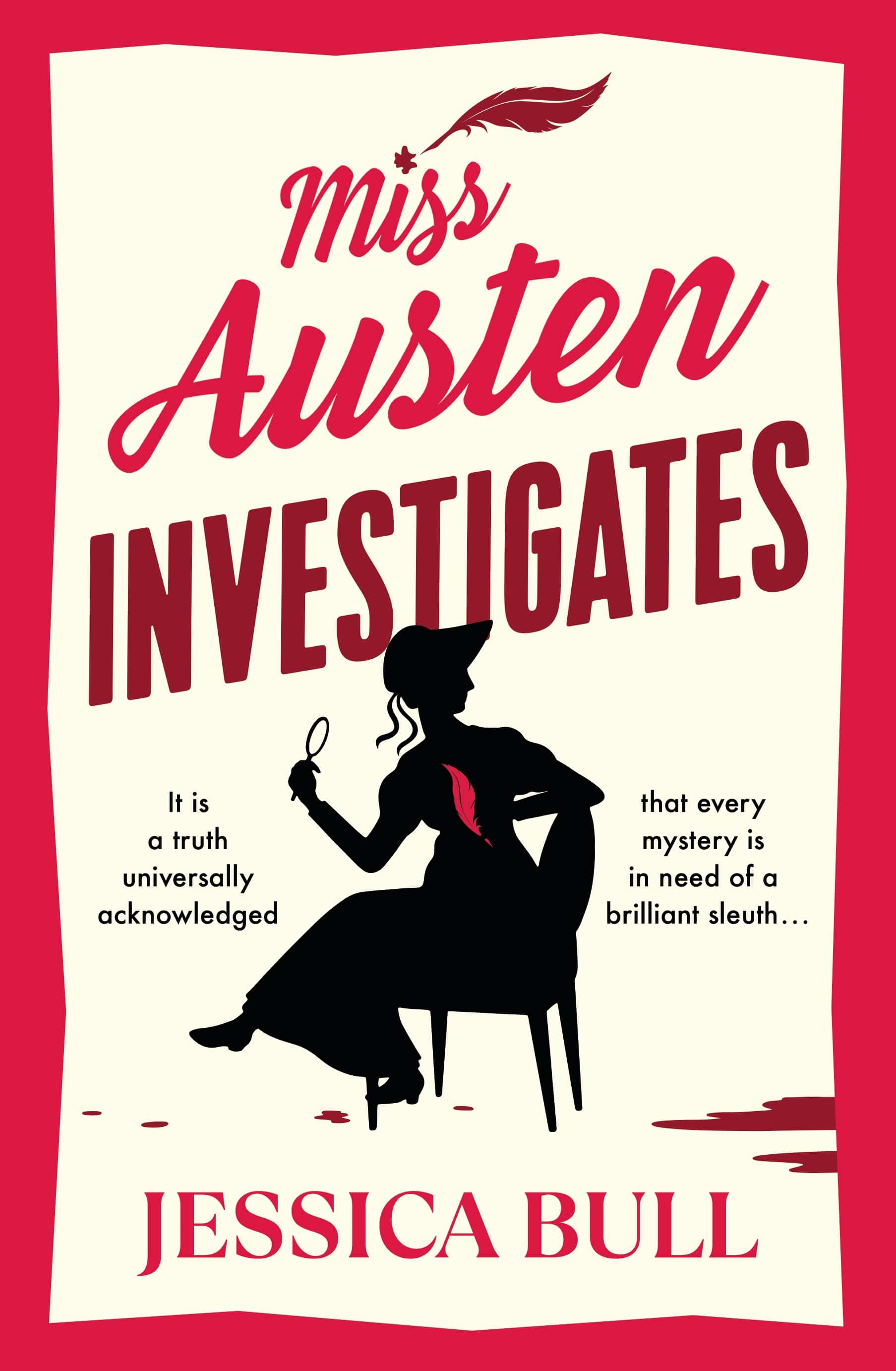
My debut novel, Miss Austen Investigates, is a tribute to Jane Austen in the form of a murder mystery. It begins with nineteen-year-old Jane enjoying a flirtation with a handsome young gentleman at a glittering ball. Unfortunately, the romance is cut short by the discovery of a milliner found bludgeoned to death. I was delighted when one of my early reviewers described it as ‘a beautiful, genteel read (if Murder can be genteel)’ as it was a similar paradox at the heart of Austen’s work that inspired me to write it.
Austen is traditionally more associated with romance than crime, but I’m not the only writer to make the connection: P.D. James’s Death Comes to Pemberley is one of my all-time favourite reads. As romantic as Austen’s stories might appear on the surface, whenever I finish reading one, I can’t help feeling a little disturbed. Sure, the heroine gets a happy ending – but there’s usually a minor female character or two who are thrown to the wolves (think of Lydia Bennet, groomed and abducted by Wickham, or Eliza, who loses her fortune when she’s coerced into marrying Colonel Brandon’s elder brother - both acts which would be considered sex crimes in our time).
These loose threads are so jarring, I wondered if Austen might have left them there on purpose. After all, she is the greatest novelist who ever lived.
The mystery element to Northanger Abbey is the most apparent: Catherine Morland turns amateur sleuth when she accuses General Tilney of murdering his wife. It might feel as if Austen is encouraging us to laugh at her ingenue heroine’s outlandish assumption, especially as Catherine’s lurid imagination is fuelled by her addiction to horrid Gothic novels (the Regency equivalent of our true crime obsession?). Henry Tilney certainly gives Catherine a pompous sermon on how his father cannot possibly have murdered his wife as this is England, a Christian country where ‘every man is surrounded by a neighbourhood of voluntary spies’.
But Mr Tilney’s enthusiastic assertions do not refute the fact that women are frequently murdered by their intimate partners, and the majority of violent acts against women and girls go unpunished. This was as true in Georgian England as it remains in every part of the world today. Catherine may be mortified into accepting her crush’s defence of his father but we, the reader, are not. It is not a huge leap of imagination for us to believe that General Tilney, a man who throws teenage Catherine out of his house, at a moment’s notice and with no protection, could be responsible for the neglect or cruelty which led to his wife’s death.
There is a simmering resentment bubbling under the surface of all Austen’s courtship novels: a carefully controlled rage at the way the law systematically disadvantaged women in favour of male property rights. I believe, like many of today’s crime fiction authors, Austen wove these dark themes into her work exactly because she wanted to make her readers angry enough to demand change. We write crime from a similar place of outrage: ‘Look at this!’ our stories scream, ‘How can it be allowed to happen?’
Therefore, when I was deciding how best to celebrate Austen’s remarkable genius, I hit upon murder mystery as the most fitting way to pay homage to her original works and showcase her brilliance. When my Jane loses faith in the authority’s ability to investigate the murder of an ordinary young woman with due diligence, she immediately kicks off one of her own. The case turns personal when her gentle brother, Georgy, is accused and thrown into gaol. With her brother’s life at stake, Jane really must find the culprit.
Desperate to save Georgy from the gallows, she enlists the help of her charismatic friends and family and sets out to interrogate polite society. Her innate understanding of human nature, irreverence for the establishment, and passion for justice have the potential to make her an excellent amateur detective. But, like Catherine Morland, she’s faced with a world where her age, class, and sex all count against her.
She’ll also need to overcome her own prejudices to arrive at the truth. As Austen put it, ‘pictures of perfection… make me sick’ and it is young Jane, the exuberant author of Lady Susan rather than the mature narrator of Pride & Prejudice, who takes centre stage in this first instalment of Miss Austen Investigates. Just like one of her own heroines, Jane has plenty of growing up to do – and her naivety may cause her some toe-curling mortification along the way.
Will she persevere and solve the case? Of course she will, she’s Jane Austen. Not only the greatest novelist, but also one of the greatest human beings who ever lived.
Miss Austen Investigates by Jessica Bull (Penguin Michael Joseph, £16.99) is out on 25th January 2024.

Read SHOTS' review by Sue Lord
Buy Miss Austen Investigates: https://linktr.ee/missausteninvestigates
Talk to Jessica on social media:
Twitter/X: @NovelistJessica (https://twitter.com/NovelistJessica)
Instagram: @jessicabullnovelist (https://www.instagram.com/jessicabullnovelist/)